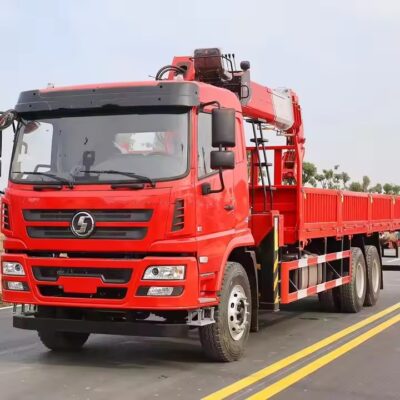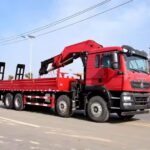The role of holownik operators and drivers is essential in ensuring the safe and efficient recovery and transportation of vehicles. Jednakże, operating a holownik can be a challenging task that comes with inherent risks. To mitigate these risks and prevent accidents, tow truck operators and drivers must prioritize safety at all times. W tym artykule, we will explore some key tips and best practices that can help operators and drivers maintain a safe working environment I minimize the potential for accidents.
- Prioritize Operator Training and Certification: Proper training and certification are the foundations of safe tow truck operations. All tow truck operators and drivers should undergo comprehensive training programs that cover essential topics such as vehicle recovery techniques, towing procedures, and safety protocols. Certification ensures that operators have the necessary knowledge and skills to perform their duties safely and effectively. Ongoing training and refresher courses should be provided to keep operators updated on industry best practices and new technologies.

- Conduct Regular Vehicle Inspections: Regular vehicle inspections are crucial to identify and address any potential issues that could compromise the safe operation of the holownik. Before each shift, operators should inspect the holownik thoroughly, including the towing apparatus, winches, hooks, and safety equipment. This includes checking for the proper functioning of all lights and signals, ensuring tire pressures are correct, and examining the condition of the brakes. Any defects or malfunctions should be promptly reported and repaired to maintain the integrity of the tow truck I minimize the risk of accidents.

- Adhere to Safety Guidelines and Procedures: Following established safety guidelines and procedures is essential for a safe towing operation. Operators and drivers should adhere to industry standards and recommended practices when it comes to loading and securing vehicles onto the holownik. This includes using appropriate equipment and techniques to ensure a secure connection and prevent the vehicle from shifting during transportation. It is also important to follow proper weight distribution guidelines to maintain vehicle stability during towing.

- Maintain a Safe Working Environment: Creating a safe working environment is crucial for tow truck operators and drivers. This includes maintaining clear communication with fellow operators and other road users, using appropriate personal protective equipment, I ensuring the work area is well-lit and free from hazards. Operators should also be mindful of their surroundings and be aware of any potential dangers, such as uneven terrain, traffic congestion, or adverse weather conditions. Keeping a safe distance from other vehicles on the road and adhering to speed limits and traffic laws is essential for accident prevention.

- Use Appropriate Towing Techniques: Proper towing techniques are vital for the safe transport of vehicles. Operators should use the recommended towing method based on the type and condition of the vehicle being towed. This may involve utilizing wheel lifts, flatbeds, or other towing apparatuses suitable for the situation. It is essential to ensure that the tow truck’s capacity and towing equipment are appropriate for the weight and size of the vehicle being towed. Improper towing techniques can lead to accidents, vehicle damage, and personal injury.

- Practice Defensive Driving: Defensive driving is crucial for tow truck operators and drivers Do anticipate and respond to potential hazards on the road. This includes maintaining a safe following distance from other vehicles, signaling intentions well in advance, and using mirrors effectively to monitor surrounding traffic. Operators should also be cautious when merging into traffic, changing lanes, or navigating intersections. Being aware of blind spots and using proper communication, jak na przykład turn signals and hazard lights, is essential for maintaining road safety.

- Manage Fatigue and Stress: Tow truck operators and drivers often work long hours and face demanding schedules, which can contribute to fatigue and increased stress levels. It is important to manage fatigue by getting adequate rest between shifts and taking regular breaks during extended periods of towing. Fatigue can impair judgment and reaction times, increasing the risk of accidents. Operators should prioritize their well-being by maintaining a healthy work-life balance and practicing self-care. Managing stress is equally important for tow truck operators and drivers. The nature of the job can be stressful, dealing with challenging recovery situations and time-sensitive demands. Finding healthy ways to cope with stress, such as exercise, meditation, or engaging in hobbies, can help maintain mental and emotional well-being. Effective stress management promotes better decision-making and overall safety on the job.

- Communicate Effectively: Clear and effective communication is essential for safe towing operations. Operators should maintain open lines of communication with dispatchers, colleagues, and other road users. This includes using two-way radios, hands-free devices, or other communication tools to relay important information and receive instructions. Effective communication ensures that all stakeholders are aware of the situation, reducing the likelihood of misunderstandings and potential accidents.

- Be Prepared for Emergencies: Tow truck operators and drivers should always be prepared for unexpected situations and emergencies. Carrying essential safety equipment, such as reflective vests, warning triangles, and first aid kits, is crucial. Operators should also be trained in emergency response procedures and know how to handle incidents such as vehicle breakdowns, accidents, or hazardous material spills. Being prepared and equipped to handle emergencies contributes to A safer work environment and the ability to provide prompt assistance when needed.

- Stay Updated on Industry Changes and Best Practices: The tow truck industry is constantly evolving, with new technologies, regulations, and best practices emerging. Operators and drivers should stay updated on these changes by actively participating in industry associations, attending training programs, and staying informed through industry publications and resources. Being aware of the latest advancements and trends allows operators to adapt their practices accordingly and stay ahead of potential risks.

Podsumowując, prioritizing safety is paramount for tow truck operators and drivers to prevent accidents and ensure the well-being of all involved. By following these tips and best practices, operators can create a safer working environment, minimize the risk of accidents, and provide a high standard of service to their customers. Remember, safety should always be the top priority in the tow truck industry, as it not only protects operators and drivers but also contributes to the overall safety of the roadways for everyone.










